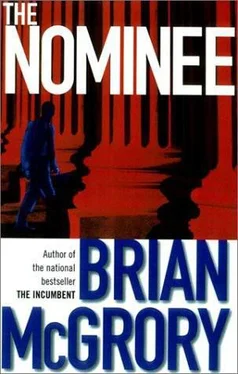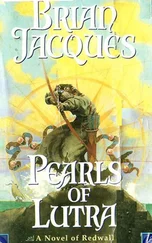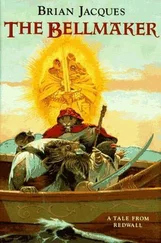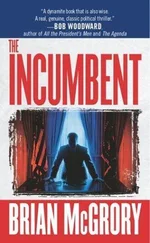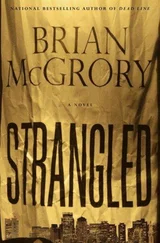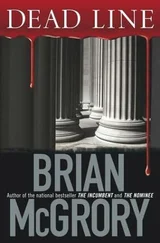Randolph walked toward him and extended his hand. “Good evening, Mr. President.”
“Clay Hutchins, son,” the president replied. “Pleasure to meet you. Was a big fan of your old man’s — and of yours. Boy, you do look young.”
“I don’t feel so young anymore, not after a few years in Boston politics.”
“Well, if it makes you feel any better, I was so excited you were coming in that I put this monkey suit on just for you.” He said this loud, then he let loose a deep, gravelly laugh.
In a softer, whiskeyed voice, he added, “The emir of Qatar is at the house tonight. Until about a month ago, I always thought Qatar was a planet, not a country. Now I come to find they have so much money from natural gas they could buy the state of California. If my polling doesn’t get any better out there, I might well sell it to ’em.
“So I spend tonight in the company of sixty sheiks in robes while Tony Bennett sings songs none of these guys ever heard before. You seen Tony Bennett lately? He looks like he stepped out of a damned time capsule, he looks so good. The guy never changes.”
“My father used to listen to him when I was a kid.”
Hutchins, so caught up in his monologue, looked at Randolph blankly. Then he said, “Come sit,” and guided Randolph to a pair of upholstered chairs angled toward each other. There were several other maps on the walls, and windows that looked out at ground level on the darkened South Lawn. A steward shut the heavy door and Bennett’s voice was suddenly no more.
Hutchins didn’t waste any time. From what Randolph read and heard and now saw, he never wasted any time — no political foreplay, no extended niceties, nothing so much as a cup of coffee and a discussion of the ongoing Massachusetts Senate race.
“Thanks for coming,” Hutchins said, his voice still rough, but softer. “That’s no small thing. I’m like the third rail these days. Politicians won’t touch me. My own party, the bunch of stodgy old fucks, doesn’t want me running again. The Democrats can’t wait to take my head off in the general. For chrissakes, only the public likes me, but here in Washington, they don’t seem to matter.”
So Bank was right yet again, Randolph thought. The president was seeking his endorsement. He began recalling his rehearsed lines on how he couldn’t at this time offer his support, but would give it every consideration as the election approached. It would make it easier to cross party lines in Massachusetts if the electorate knew that the president had been good to the state in terms of fully funding various public works and public safety projects. Hutchins would respect that kind of quid pro quo, he thought.
“I’m rambling,” Hutchins said, bearing down on Randolph. “And believe it or not, I have to get back to this party before I create an international incident by disappearing on my guests.
“So here’s the deal. I need an attorney general. Who the hell would have thought that Westfall would resign to become commissioner of baseball, though who can blame him? Better than dealing with all this bullshit, and you don’t have to worry about some reporter crawling up your ass for taking free seats to the World Series. Anyway, I want to cross party lines with my nominee. I want to show the nation that cooperation doesn’t have to be just in spirit. I want to prove that I don’t give a damn about any more Democratic-led investigations. I think the only thing left to investigate about me is the size of my balls, but hell, if you decide you need to see’em, I’ll show’em to you right now.”
Randolph sat stunned, staring at Hutchins, who actually had his hand on the top of his fly. He thought he knew where this was leading now, but he refused to believe it, not yet, not until he heard the words.
“You were a prosecutor up there in Boston. You’re a moderate. You’re young and ambitious and maybe you even want to live in this house yourself someday. Here’s your running start. I want you to be my attorney general.”
Randolph blinked hard a couple of times, uncrossed his legs and leaned forward. Attorney general of the United States, just like Robert F. Kennedy. The most powerful law enforcement official in the nation and maybe the world.
“I’ve had the FBI do an expedited background check and you come up clean. Anything I need to know about you before we go any further?”
Randolph’s eyes fell to the floor for the quickest flicker of a moment, then back to Hutchins. He shook his head. “No, sir.”
Hutchins, ever intuitive, seemed to sense the hesitance. “You’re sure? Believe me when I tell you, the press can find things out that you think are hidden away forever.”
“Yes, sir.”
“Good. Then you want to think this over for a while. The reason I asked you in at this odd hour on a Saturday night is so there wouldn’t be any damned reporters hanging around and you wouldn’t be on my official schedule. My own staff doesn’t know I’m asking you. TheWashington Post says its down to two finalists, neither of whom I like. Take it or leave it, no one knows you are here.”
Randolph thought about Bank sitting over in the West Wing, how he’d want to dissect this offer five ways from Wednesday, drain the life out of it, fillet it, run it through a focus group, then go out with a poll. That’s how political operatives were. They wore black socks over their pale hairy legs to the beach. You ask them what their outside interests are and they stare at you as if they don’t have a clue what you mean. They’re great with advice, but never, ever are they putting their own good name before the voters. When they lose, it’s on to another campaign.
Sitting with the president of the United States deep in the White House, he decided to do something he rarely ever did. He’d make a decision without Bank. Bank knew a lot about him, but not quite everything.
“I accept.”
“You what?” Hutchins asked this as if he was surprised, almost angry, as if he was about to counsel him not to do it.
Both men looked at each other for a long moment before Hutchins continued, his voice low again and his tone grateful, “Thank you.”
“Thank you, Mr. President.”
Another pause, before Hutchins broke it. “What would you say to a Rose Garden announcement Monday afternoon. We’ll clang all the bells and blow all the whistles. You’re going to make one hell of a great attorney general for the United States.”
“That would be terrific, sir.”
“Don’t call me sir.”
“I won’t.”
Randolph asked, “To help me in my home state, do you have any objections to me leaking this to the local paper ahead of time?”
Loud again. “TheRecord? I hate them. Go right ahead.”
Hutchins stood up, signaling the end of the meeting. “Back to the Qataris. They’re probably drilling for gas in the damned East Room by now.”
After his flight back to Boston, Randolph shut his office door, settled onto a soft, beige settee, put his wingtips up on the antique coffee table and flicked the top off a bottle of Heineken. He closed his eyes and took a long pull of his beer.
Attorney general of the United States. A massive office in the Justice Department building. FBI protection. The lead in the most sophisticated, most sensitive, most sweeping investigations in the nation.
He would get constant coverage on the front pages of theWashington Post and theNew York Times, profiles in the weekly news magazines, regular airtime on the networks. Someone might even write his biography, and of course, do the job well and he’d be touted as a possible Democratic presidential candidate.
It was a gimme, he told himself, an automatic. The president offers you a job like that, you don’t say no. No way. He was halfway through his second term as governor, and there was a been-there, done-that quality to it all as he tried to get ramped up for his third gubernatorial campaign. The penny-ante fundraisers with the egotistical contributors who thought that by accepting their five hundred dollars, you suddenly owed them your soul. All those women with flabby arms and cat food breath who pressed against him getting their picture taken at every campaign stop. Now it was time to head to a bigger stage, Washington, DC, the Broadway of national politics. His old man, he thought, would be so proud.
Читать дальше
